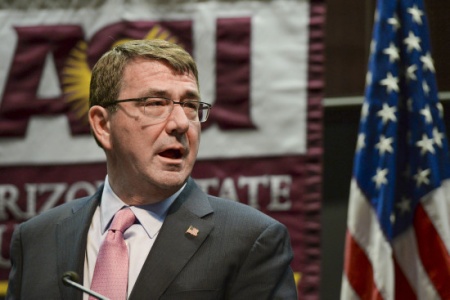WASHINGTON — The failure to churn out disciplined fighters as a counter to the Islamic State means the United States will likely have to stop training select rebels outside of conflict zones and start working inside of Syria with forces that may have connections to terrorist groups.
With IS making advances where Russian planes are bombing without discretion for U.S.-backed rebels, the shuttering of the $500 million “train and equip” program indicates the United States is reassessing its political and military aims in war-torn Syria.
“I think the policy is such a mess that it’s not too concerning that we’re officially recognizing what everyone knows—that the train and equip program wasn’t working,” said Michael O’Hanlon, a senior fellow specializing in national security and defense policy at the Brookings Institution. “At least we aren’t deluding ourselves any longer.”
The “pause” of the ineffective train and equip is not surprising after weeks of criticism from lawmakers and military experts. But that the United States remains committed to not deploying American ground troops or aligning with Russia’s military operations leaves little room for countering IS beyond airstrikes.
“The key shortcoming is the absence of a capable ground force, which is essential for achieving the kind of success against ISIL necessary to reduce the long-term regional and terrorist threat,” said Brookings Senior Fellow Daniel Benjamin during a recent Foreign Affairs subcommittee hearing on U.S. counterterrorism strategy in Syria.
Military experts say finding rebel soldiers that align with American values and military goals — namely opposition to IS and Syrian President Bashar al-Assad — is a big challenge. If the United States restarts its train and equip program, it will need to evaluate recruits more broadly when it comes to their ideology.
“Finding these people that have to be totally on the same page as the U.S., train them in Jordan and send them into Syria, has been a total failure,” said Phillip Louhaus, a defense and national security analyst at the American Enterprise Institute. “I don’t think they will revisit [train and equip] and say ‘well we want you to be anti-ISIS.’ ”
The problems with the train and equip program in Syria also stemmed from a geographical divide between training and operations, analysts say. The United States had been training the rebel forces outside of Syria.
“It’s not that it doesn’t work. The Syrians don’t want to sit in Georgia or Jordan for four years,” said RAND Corp. analyst Ben Connable, a retired Marine intelligence officer. “These guys want to go back and fight. They don’t want to spend four years training.”
Louhaus, in a phone interview, similarly suggested the United States might have more success training rebel forces inside Syria.
The Pentagon’s shift in train and equip strategy, announced recently, will stop training but continue to equip certain rebel forces. Supplying more known quantities, such as the Kurdish militia, is seen by many experts as a safe bet for some portion of ground support while train and equip is revaluated.
Defense Secretary Ash Carter’s stated remarks that defeating “ISIL in Syria will depend in part on the success of local, motivated and capable ground forces” strongly indicates the training program will eventually be reinstated.
“I don’t object to the short-term reorientation towards providing more weaponry to existing groups,” O’Hanlon said. “This needn’t be either/or — and it needn’t be a permanent setback or decision, so much as a realistic assessment and recognition of where we are today.”
Yet before the train and equip program is brought back into the strategic mix, it seems clear that America’s involvement in Syria will need more clarity in terms of mission and goals.
Some experts, critical of the Obama administration’s lack of a coherent policy with respect to Syria, believe the uncertainty has permitted groups like IS to rise to power and allowed Russia’s subsequent intervention to outshine the United States in the region.
“We have the finest military in the world,” said Stephen Blank, a senior fellow at the American Foreign Policy Council. “Military power in the absence of political vision leads you nowhere.”
A revamped, localized train and equip program accounting for a broadened ideological base of recruits is a reasonable foundation to build upon. Yet with IS, Iran and now Russia embedded in the conflict, the United States has to be both creative and careful moving forward with its Syrian strategy.
“Any move we take is going to have ripple effects beyond just Syria,” Louhaus said. “Every move is going to have a consequences.”


